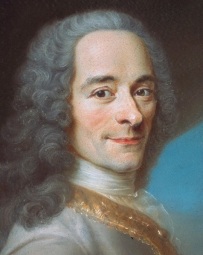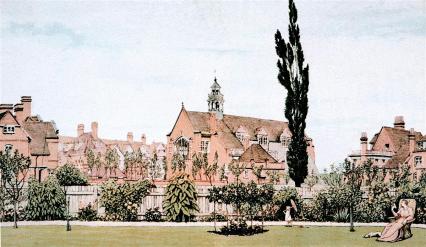Preached on 21st May, at St. Michael & All Angels, Bedford Park
Easter 6 (Evensong); Zechariah 8:1-3; Revelation 21:22-22:4
“When one looks at the rest of all possible worlds, one finds that this is the best of all possible worlds.”
The words of Dr. Pangloss in Leonard Bernstein’s Candide: The musical version of Voltaire’s philosophical novel in which the same character has the less punchy mantra:
“It is impossible for things not to be as they are, because everything is for the best.”
Voltaire wrote Candide as an argument against his rival Leibniz who at the time was arguing for a kind of Logical Optimism: Of all the possible Universes that exist, our’s is the one that does. God is good and loving and therefore chooses the best possible world to bring into being. Therefore the world in which we live is the best of all possible worlds.

Voltaire saw a problem with this, and, in his inimitable way, wrote Candide, in which Dr. Pangloss (a philosopher whose resemblance to Leibniz was not remotely coincidental) stubbornly clung onto his view that the world was always at its best as really bad things happened to him, again, and again, and again… And Candide isn’t a story for those of a weak disposition!
Do we really live in the best of all possible worlds? Ask the guys who sit under Turnham Green Bridge. Ask anyone who’s had their benefits sanctioned. Ask that question on the wards at Charing Cross hospital. Ask those who’ve arrived as refugees from Syria. Ask their family members who are still there…
And then there are always the somethings: They may be big they may be small… They may be few, they may be many… The somethings that keep life from being simply, and sublimely perfect.
The ‘life would be perfect ifs’…
Life would be perfect if I had more money…
Life would be perfect if my house was bigger; if the tubes were more frequent; if my work was easier; if my toddler would sleep at night…
And so we imagine what the world would be like without those things. If life was better… If life was perfect…
We imagine our Utopias: The ideal worlds where nothing is wrong and life is perfect. The best of all possible worlds.
Our Utopias can say a lot about us: If we’re concerned about the environment we might imagine a world of clean air and unspoilt habitats. If our interests are economic we might envisage a world of financial stability. On this Rogation Sunday, it is traditional for farming communities to pray for the perfect harvest.
Gene Rodenberry, the creator of Star Trek saw a Utopia without any religion (as he felt it was divisive) whereas George Lucas, the creator of Star Wars saw a galaxy where people were far more Spiritual and under the watchful protection of the order of Jedi (think Jesuit priests with light-sabres).
Martin Luther King had Utopian ideals… But then so did the Nazis… IS have their idea of Utopia… And so too does every single candidate standing for election next month.
Tonight we heard two Utopian visions: Zechariah was writing shortly after the return from exile. The people were struggling to rebuild lives, communities, relationships. They’d laid the foundations to rebuild the Temple, but were making very slow progress with it. He envisages a Jerusalem in which children play, men and women live to a great age, the people gather in safety, in prosperity and in peace…
Similarly for St. John the Divine: Imprisoned for his faith on the labour-camp island of Patmos (a name that means ‘my killing’). Trying to exhort and encourage a persecuted Church in the early days of Christianity. He promises a world where kings and people gather to bring glory and honour to God. Where no Temple is required because God is all and everywhere. Where the crystal-bright river flows from the tree of life and the nations are healed… Nothing accursed… Nothing unclean… Perpetual worship in the light of God’s presence…
Each world a far cry from the lived reality of their writers.
Each world a far cry from our lived reality…
There is a limitation to Utopian thinking: Quite a major one. As Thomas More, the sixteenth Century philosopher who coined the term Utopia explained, the mark of Utopia is its unattainability.
Think about it:
So you want more money? You get more money… But you could still have more…
You lose that weight… But you could still be thinner, more toned, your muscles could be bigger…
You’ve bought that big house? Then you see a bigger one in the estate agent’s window…
In Candide, Voltaire writes about El-Dorado: An economic Utopia abundant in gold… There children casually play with gemstones in the streets and the King of El-Dorado is happy to give the characters as much gold as they’d like because there’s so much of it about he doesn’t understand the fuss about the ‘yellow mud’. All this gold… worthless…
Plato, hypothesised Atlantis as a political Utopia, a perfect state… But then there was an earthquake and it sank into the sea… Not so strong and stable after all it seemed…
When slavery was abolished, the world wasn’t magically transport us into a new, perfect, egalitarian era: The world still needed the Civil Rights movement; the end of Apartheid; a black US President… The world still needs the Black Lives Matter movement.
Black rights, women’s rights, gay rights, disabled rights, whose rights will we be fighting for next and whose will we be fighting for in five, ten, fifty, a hundred year’s time in a world that can never be perfect?
Or then again, maybe you yearn for ‘the good old days’? You long for a time when children never answered back, when politicians worked for the people, when no one was afraid of a hard graft, and the community gathered together on a Sunday afternoon for unlimited rice pudding in the parish hall… Lovely… But you’re probably also thinking of a time with greater infant mortality, slum-conditions for the poorest, smog, conscription and hanging…
Perfection can only be aspirational because our world, our tangible, material world made of people and society and things… Is not perfect… It isn’t and it cannot be… Not on our terms anyway…
But our readings today, were about a different sort of Utopia. Yes, we could easily map in the concerns of the writers into their contexts, but even these were only relevant in terms of a greater perfection.
The Utopian visions of both Zechariah and St. John ultimately describe the perfect state of being as a state of being with God and within God. God who returns to Zion and dwells in the midst of Jerusalem. God whose presence itself is the temple, whose glory lights the city and whose name is on the forehead of all his servants. God who by His defining nature is perfect and as He alone is perfect, God who is perfection itself.
It’s easy to struggle with this rather abstract concept… We just can’t really describe God’s perfection in human terms: We’re not equipped… Our imaginations try to objectify the very vivid, visual language of the scriptures: What does the city look like? Clean streets? Redbrick houses with white railings? Sights, sounds smells… And the people?: What are they like? Are they good looking? Are they able-bodied? Did any of them vote for Brexit?

But when we do that we begin to miss what’s going on; As we found when we explored the limitations of Utopia, perfection is relative: We choose different values to aspire to. What matters about this city isn’t what it looks or sounds like, or whether its tubes ever go on strike… What matters is that it is perfect because it exists in and as part of the reality of God.
Perhaps it’s easier to be an optimist if you have religion because perfection isn’t just an aspirational state. Our hope, our Utopia is founded in what we believe, through faith, to be a reality, a reality to which we have set our course: The reality of God… The best of all possible worlds.
AMEN



Not sure I agree with your exegesis of Star Trek, Fr. E. You need to watch ‘Bread and Circuses’ again…….
LikeLike